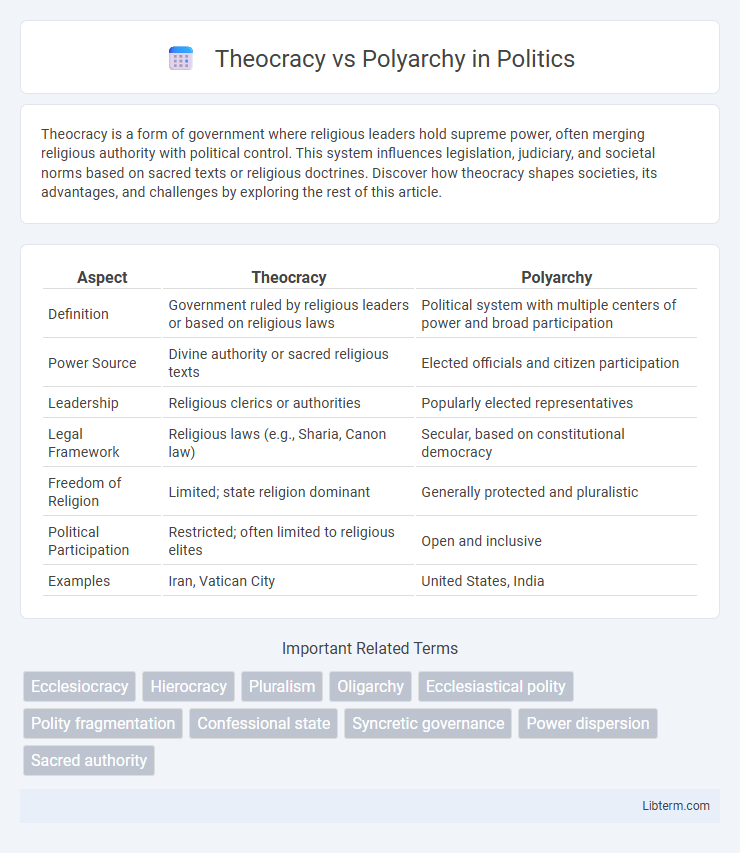Theocracy is a form of government where religious leaders hold supreme power, often merging religious authority with political control. This system influences legislation, judiciary, and societal norms based on sacred texts or religious doctrines. Discover how theocracy shapes societies, its advantages, and challenges by exploring the rest of this article.
Table of Comparison
| Aspect | Theocracy | Polyarchy |
|---|---|---|
| Definition | Government ruled by religious leaders or based on religious laws | Political system with multiple centers of power and broad participation |
| Power Source | Divine authority or sacred religious texts | Elected officials and citizen participation |
| Leadership | Religious clerics or authorities | Popularly elected representatives |
| Legal Framework | Religious laws (e.g., Sharia, Canon law) | Secular, based on constitutional democracy |
| Freedom of Religion | Limited; state religion dominant | Generally protected and pluralistic |
| Political Participation | Restricted; often limited to religious elites | Open and inclusive |
| Examples | Iran, Vatican City | United States, India |
Understanding Theocracy: Definition and Core Principles
Theocracy is a form of government where religious leaders hold supreme authority, and state policies are deeply intertwined with religious doctrines. Core principles include the rule by divine guidance, the integration of sacred texts into legal systems, and the legitimization of political power through spiritual authority. Theocratic regimes typically prioritize moral codes derived from religion, influencing social, legal, and political institutions.
Polyarchy Explained: Meaning and Characteristics
Polyarchy refers to a form of government characterized by widespread participation and contestation, allowing multiple groups to influence decision-making processes. Key characteristics include competitive elections, inclusive political participation, and protected civil liberties that enable citizens to express diverse interests and preferences. Unlike theocratic rule, polyarchies emphasize pluralism and institutionalized channels for political competition and accountability.
Origins and Historical Contexts of Theocracy
Theocracy, rooted in ancient civilizations such as Mesopotamia and Egypt, emerged as a governance system where divine authority dictated political power, intertwining religious and state leadership. Early theocratic states often centralized control through priest-kings or religious elites, legitimizing laws and policies by invoking sacred texts or deities. Unlike polyarchy, which evolved later during democratic transitions emphasizing pluralism and competitive elections, theocracy historically reinforced hierarchical structures based on spiritual legitimacy and religious tradition.
The Evolution and Emergence of Polyarchic Systems
Polyarchic systems evolved as inclusive governance models emphasizing broad political participation, pluralism, and institutional checks and balances, contrasting sharply with the centralized, divinely justified authority characteristic of theocratic regimes. This evolution was driven by increasing demands for political rights, civil liberties, and mechanisms to prevent power concentration, fostering competitive elections and rule of law. The emergence of polyarchy marks a significant shift toward democratic governance, characterized by dispersed power and accountability frameworks.
Power Structure: Comparing Authority in Theocracy and Polyarchy
Theocracy centralizes authority in religious leaders who govern based on divine laws, intertwining political power with spiritual legitimacy. Polyarchy disperses power among multiple elected officials and institutions, emphasizing pluralism and democratic participation. This fundamental difference shapes decision-making processes, where theocracy relies on sacred mandates, while polyarchy depends on collective representation and accountability.
Religion and Politics: Theocratic Influence vs. Pluralistic Governance
Theocracy centralizes political power within religious institutions, where laws and policies are deeply rooted in sacred doctrines and clerical authority, shaping governance through divine mandates. In contrast, polyarchy emphasizes pluralistic governance, featuring multiple political parties and interest groups that foster competition, representation, and secular policymaking insulated from religious control. This fundamental difference highlights the theocratic prioritization of faith-based legitimacy over the democratic inclusiveness and political diversity characteristic of polyarchal systems.
Citizen Participation: Involvement in Theocratic vs. Polyarchic Societies
Citizen participation in theocracy is typically limited to religiously sanctioned roles, with governance closely tied to divine authority and clerical elites, restricting political engagement to religious conformity and approval. In polyarchies, broader citizen involvement is encouraged through elections, open debate, and pluralistic institutions that allow diverse groups to influence decision-making processes. This fundamental difference results in polyarchic societies fostering more inclusive political participation and accountability compared to the exclusive, faith-based involvement in theocracies.
Case Studies: Modern Examples of Theocracies and Polyarchies
Iran exemplifies a contemporary theocracy, where religious leaders hold supreme political authority, blending Islamic law with governance structures, while India represents a polyarchy with its expansive democratic framework characterized by competitive elections and multiple centers of power. Theocratic regimes like Saudi Arabia enforce religious doctrine as state law, restricting political pluralism, contrasting sharply with polyarchies such as the United States, which emphasize political participation and civil liberties. These case studies highlight the fundamental differences in political legitimacy, authority sources, and citizen engagement between theocratic governance and polyarchic systems.
Societal Outcomes: Stability, Freedom, and Rights
Theocracy often ensures societal stability by enforcing uniform religious laws but typically restricts individual freedoms and suppresses diverse rights, limiting political pluralism. Polyarchy fosters extensive political participation and protects civil liberties, promoting greater freedom and broader human rights yet can experience more political contention and slower decision-making processes. Balancing societal stability with freedom and rights remains a complex challenge, with theocracy prioritizing order through religious authority and polyarchy emphasizing democratic inclusiveness.
Theocracy vs. Polyarchy: Future Trends and Global Relevance
Theocracy, characterized by governance under religious authority, contrasts sharply with polyarchy, which emphasizes inclusive, multiparty democratic participation. Future trends indicate increasing challenges for theocracies due to global demands for human rights and secular governance, while polyarchies are adapting through digital democracies and broader civic engagement. The global relevance of these systems hinges on their ability to balance authority with pluralism, influencing stability and policy effectiveness worldwide.
Theocracy Infographic

 libterm.com
libterm.com